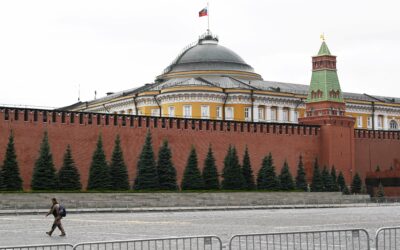
Blindsided by U.S. Ukraine Vote, Kremlin Scrambles to Respond
SUBSCRIBER+ EXCLUSIVE REPORTING — Russia’s reaction to the new infusion of U.S. aid for Ukraine has ranged from shrugs to fury, from warnings of nuclear […] More
EXPERT PERSPECTIVE — If Russia ultimately launches military operations against Ukraine, U.S. President Joe Biden has signaled that the U.S. would respond not with direct military intervention but unprecedented economic sanctions.
Speculation has centered on cutting Russia off from the SWIFT international payments systems as one robust option. This would have an immediate and dramatic negative impact on the Russian economy, so much that in 2019, the Russian Prime Minister described the prospect as being tantamount to a declaration of war. Putin is clever enough though, to have considered this before embarking on his highly confrontational Ukraine gambit, suggesting he believes he has an ace up his sleeve.
U.S. intelligence has doubtless given President Biden assessments on Putin’s likely reactions. Let us hope they don’t suffer from the same failure of imagination that plagued assessments in 1941 and 2001, in which the ambitions and audacity of our adversaries was grossly underestimated at tragic cost.
In the summer of 1941, U.S. officials knew that war with Japan was a real possibility, especially after imposing an oil embargo in response to Japanese military actions in French Indochina, a crippling blow given that Japan then imported 80 percent of its oil from the United States. What was surprising was not that Japan attacked in December 1941, but that it dared to attack the U.S. Pacific Fleet in its home port at Pearl Harbor. Sixty years later, in the summer of 2001, warning signs about another foe, this time Al-Qaeda, were also “blinking red.” The intelligence community repeatedly warned policymakers of indications that Al-Qaeda was planning a spectacular attack yet once again, the failure was not in anticipating an attack, but in failing to imagine its breathtaking audacity.
Putin may be bluffing on Ukraine, but he has invested an unusual amount of personal capital stoking the crisis, including penning an essay in July 2021, challenging Ukraine’s legitimacy as a country and Ukrainians as a people. When he speaks of the collapse of the USSR, which resulted in the establishment of an independent Ukraine, Putin tends to flash uncharacteristic emotion. It is an intensely personal issue for him, and we would be wise to consider the possibility that he sees reuniting Ukraine, Belarus, and perhaps northern Kazakhstan with Russia as a key life goal and has decided that now is the moment to make his move. If indeed this is that moment, Putin will play to win. Being the objectively weaker party in terms of raw economic and military power, as was Japan in 1941, he could only expect to prevail by being aggressive, breaking norms, and employing shock and deception.
Western experts on Russian military strategy and doctrine, such as Timothy Thomas and Keir Giles, have tracked the evolution of Russian thinking on future conflict and provided important clues as to how Russia would approach a decisive showdown with the West. A key aspect of the Russian view is the centrality of information warfare in modern conflicts relative to traditional force-on-force combat. The objective is not to defeat military formations on the battlefield but to inhibit their ability to function through precisely targeted information strike operations against their command and control, as well as to sow chaos, confusion, and indecision among the enemy leadership and population through similarly targeted attacks against civilian communications, power, transportation, and other key infrastructure. The Russian doctrinal concept of “new generation warfare” developed since the fall of the USSR, recognizes that Russia’s conventional combat power is much diminished from the Soviet era, but it has in the meantime, developed an extremely sophisticated and wide-ranging intelligence apparatus leveraging HUMINT, electronic-technical, cyber, commercial, and even criminal capabilities to systematically map out, target, and engage our weaknesses. This form of conflict, which favors deception, secrecy, and guile over brute military force, is tailor made for Russia’s leader, who remains at heart, a KGB man with KGB sensibilities.
The Cipher Brief hosts private briefings with the world’s most experienced national and global security experts. Become a member today.
So, what might this mean in practical terms? The recent SolarWinds hack and numerous others attributable to Russian actors, have demonstrated the porousness of U.S. cyber defenses. Russian doctrine clearly suggests that these vulnerabilities are being exploited not only to harvest intelligence but to reconnoiter critical U.S networks to lay the groundwork for disrupting or destroying them. Large-scale Russian cyberattacks against Ukraine’s electric power grid, media, and banks after the initial Russian incursion in 2014, leave no doubt that cyber operations attacking critical infrastructure are a key element in Russia’s conflict playbook.
We should also note that while the West tends to associate information warfare with cyber and social media influence activities–hackers, trolls, and bots–the Russian conception encompasses much broader methods, many of them highly kinetic in nature. For them, information operations are not limited to the use of information infrastructure in their employment, but include physically destructive attacks against vulnerable pressure points designed to achieve “information effects.” With this in mind, we would be well served if our intelligence community flagged these as serious possibilities in the event of a major crisis involving Russia.
It is worth pondering, for example, that Russia has developed, at tremendous expense, a sophisticated capability using exotic and highly specialized nuclear submarines and ships to attack the extensive network of undersea cables which carry 97% of global communications traffic, including the equivalent of $10 trillion in financial transactions daily. A coordinated, large-scale attack on this network would have the potential to wreak enormous economic, political, and social havoc on both sides of the Atlantic. In Putin’s calculation, might that not be an appropriate response to a Russian ejection from SWIFT or other sanctions designed to cripple the Russian economy?
Go beyond the headlines with expert perspectives on today’s news with The Cipher Brief’s Daily Open-Source Podcast. Listen here or wherever you listen to podcasts.
In 2010, the U.S. wrapped up 10 Russian “illegals” (intelligence officers operating under deep, non-official cover) who were working for Russia’s civilian foreign intelligence service, the SVR, inside the United States. This coup should be tempered, however, by the knowledge that there has been no similar success against illegals operations run by Russia’s military intelligence service, the GRU, at least not publicly, and it is the GRU that would most likely have the mission of conducting sabotage operations behind enemy lines in the event of a conflict. What kind of sabotage might such personnel carry out? Recent incidents provide sobering food for thought.
These incidents may not be connected to the GRU, but they provide insights as to how deep cover saboteurs using low-level technology but possessing high-level clandestine tradecraft, military skills, and armed with information on single points of failure in our critical infrastructure could generate outsized disruptions within our own territory and that of our allies.
Odds are that Putin will limit his goals to those he is confident he can achieve, ideally using the threat of war to intimidate the West into an agreement that effectively cedes Ukraine to a Russian sphere of influence without having to fight, or failing that, launching military action to occupy more of eastern Ukraine and perhaps establish a land bridge along the Azov coast to the Crimea.
Mindful of the lessons of 1941 and 2001 however, we should remain vigilant and not fail to imagine the possibility that Putin has much grander ambitions, such as reabsorbing the entirety of Ukraine and breaking NATO in the process, and correspondingly a far more aggressive strategy for realizing them, perhaps including unexpected actions that would immediately and dramatically affect the lives and livelihoods of Americans here at home. Putin has worked diligently and at great cost to develop strategic but non-nuclear means to do this, such as those described above. We should not discount the possibility that he will use them.
Read more expert-driven national security perspective and analysis in The Cipher Brief
Related Articles

SUBSCRIBER+ EXCLUSIVE REPORTING — Russia’s reaction to the new infusion of U.S. aid for Ukraine has ranged from shrugs to fury, from warnings of nuclear […] More

SUBSCRIBER+ EXCLUSIVE REPORTING — When Chinese President Xi Jinping came to San Francisco last November to meet with President Joe Biden, Chinese pro-democracy activists in […] More

SUBSCRIBER+EXCLUSIVE EXPERT PERSPECTIVE — More than two years after its withdrawal from Afghanistan, the U.S. still does not have a clear way forward in the […] More

SUBSCRIBER+ EXCLUSIVE REPORTING — Ukrainians greeted Saturday’s long-awaited House passage of $60.8 billion in aid with justifiable jubilation. For months, their soldiers, civilians, and political […] More

SUBSCRIBER+ EXCLUSIVE REPORTING — A race for control of space is underway, and just as on earth, the U.S. and China are the top competitors. […] More

SUBSCRIBER+ EXCLUSIVE REPORTING — For nearly a week, the Middle East and much of the world were on a knife’s edge, waiting for a promised […] More
Search